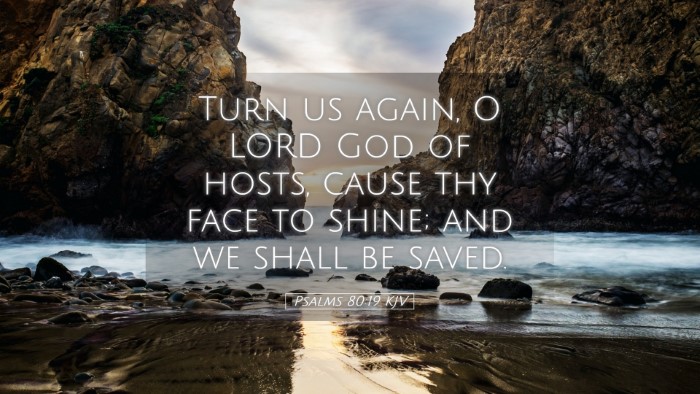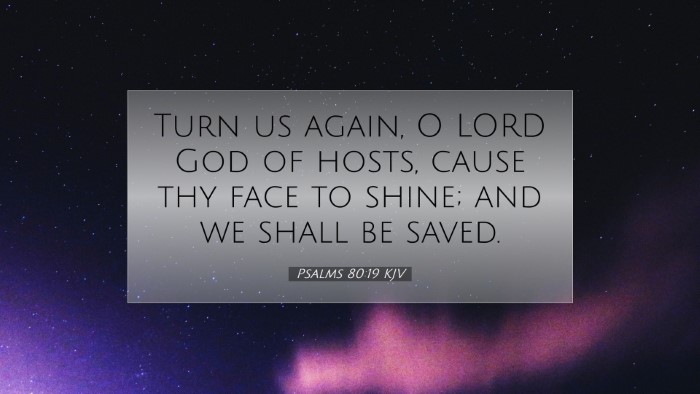Psalms 80:19 Commentary
Bible Verse: “Turn us again, O LORD God of hosts, cause thy face to shine; and we shall be saved.” (Psalm 80:19, KJV)
Introduction
Psalm 80 is a poignant prayer for restoration, reflecting the deep yearning of Israel for revival and the presence of God amid their trials. This final verse encapsulates the essence of the psalmist's cry, highlighting the themes of divine intervention, restoration, and communal salvation. The insights derived from public domain commentaries provide a rich examination of this verse's nuances.
Theological Significance
Addressing 'the LORD God of hosts':
The psalmist appeals to God using the title "LORD God of hosts," which signifies God's sovereignty over all creation and His command over celestial armies. This title evokes the imagery of divine power and authority, emphasizing God's ability to intervene in human affairs. According to Matthew Henry, this acknowledgment of God’s might reinforces the believer’s trust in God’s capability to restore what has been lost.
The Call for Restoration:
The plea to "turn us again" speaks of a desire for repentance and a return to a right relationship with God. Albert Barnes elaborates that this reflects an understanding that the restoration of spiritual vitality begins with a turning back to the Lord. The repetition of this plea indicates a deep yearning and an acknowledgment that restoration is entirely contingent upon God’s action.
God’s Face and Its Significance
The phrase "cause thy face to shine" draws from the biblical imagery of God’s presence, which often signifies favor and blessing. Adam Clarke comments on this imagery, emphasizing that God’s face shining upon His people is an indication of His grace, protection, and guidance. This theme resonates throughout Scripture, highlighting that when God turns His face toward His people, they experience transformation and renewal.
Implications of God's Favor:
The desire for God's face to shine also illustrates the deep relational aspect of faith. The psalmist is not merely seeking external blessings but is yearning for a renewed and intimate connection with the Lord. This reflects a profound truth in the life of a believer—true salvation is found in the presence of God.
Community Perspective
Psalm 80 is not just an individual lament but a communal cry, indicating the plight of Israel as a nation. This collective aspect suggests that God’s restoration is not only for the individual but for the community at large. Matthew Henry points out that God's people often experience the consequences of collective sin and disobedience, thus their dependency on divine mercy must also encapsulate the desire for corporate repentance and healing.
The Assurance of Salvation
The concluding phrase “and we shall be saved” serves as a powerful affirmation of faith. It conveys a confident expectation that divine intervention will lead to salvation. Albert Barnes notes that this declaration rests on the certainty of God's promises. The psalmist, recognizing the futility of human effort, directs the appeal to God's power and goodness for the ultimate realization of salvation.
The Nature of Salvation:
The concept of salvation here encompasses both physical and spiritual deliverance. It draws attention to the holistic nature of God’s redemptive work in the lives of His people, which includes restoration from calamity, renewal of spirit, and the hope of eternal security in God’s presence.
Conclusions and Reflections for Today
As we reflect on Psalms 80:19, it becomes evident that the themes of longing for God’s presence and the honest recognition of human frailty are as relevant today as they were in ancient Israel. Pastors, students, and scholars can glean important lessons about the importance of community prayer, the yearning for divine presence, and the assurance of God’s ability to save.
In a world beset by challenges, the call to “turn us again” serves as a reminder of our need for constant repentance and the longing for God’s grace. As we seek God’s face, we should do so with the confidence that He hears our cries and desires to shine His light upon us, ensuring our redemption and renewal.


